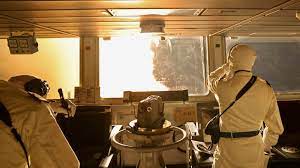Jaishankar, Iranian Ministers Explore Long-Term Cooperation Framework for Chabahar Port Development
During his visit to Iran this week, Union Minister of External Affairs S Jaishankar met with Iranian Ministers of Roads and Urban Development Mehrdad Bazrpash and Foreign Minister Hossein Amir-Abdollahian. They discussed creating a framework for long-term cooperation regarding Chabahar Port.

According to an Iranian official media article, Bazrpash said that a working committee would facilitate the activation of transit capacity and the use of the North-South route, and both countries suggested creating a joint transportation committee to increase collaboration between them.
During his discussion with his Iranian counterpart, the minister of foreign affairs said that regional connectivity is an essential foundation of ties between Iran and India. The topics of connection occupied a significant portion of Jaishankar and Hossein Amir-Abdollahian’s agenda throughout their conversations.
“I reaffirmed India’s desire to take use of Iran’s strategic location to get access to markets in Afghanistan, Central Asia, and Eurasia. “We talked about the potential for reviving the International North South Transport Corridor,” said Jaishankar.
The International North-South Transport Corridor (INSTC) aims to establish a freight corridor linking South Asia with the Middle East and Europe via an extensive network of road, rail, and marine lines. The 7200 km corridor will cross Europe, Central Asia, Russia, India, Iran, and Azerbaijan.
In 2014, two dry runs were carried out to evaluate the corridor’s viability. The first route went via Bandar Abbas to connect Mumbai to Baku, while the second route went through Bandar Abbas, Tehran, and Bandar Anzali to connect Mumbai to Astrakhan.
The two ministers also spoke on India’s role in the construction and management of the port at Chabahar. Hossein Amir-Abdollahian said that the two countries have been collaborating on this initiative for the last 20 years.
“I emphasized India’s dedication to this initiative and we spoke about how we might create a solid, long-term plan for India’s engagement in the years to come. “I emphasized the need to monitor the project’s progress under the direct supervision of the political leadership, given the significance of this project for both countries,” he added.
WHY THE CHABAHAR PORT IS ESSENTIAL
With a view of the seaport that gives access to Central Asia and Europe, the Chabahar port is strategically and commercially significant. It is located in southeast Iran, along the Gulf of Oman.
India wants to bypass Pakistan by developing the port at Chabahar because it offers a more direct and safe trading route for Indian commodities to Afghanistan.
The majority of India’s humanitarian supplies to the Afghan people have gone via Chabahar port, including a supply of 50,000 tons of wheat. Earlier cargoes were driven by trucks across Pakistan and over the border at Wagah-Attari.
Jaishankar also met with Iranian President Ebrahim Raisi, during which he expressed India’s desire to finalize an all-encompassing deal for long-term collaboration on the port development of Chabahar.
The Union minister emphasized India’s commitment to the Chabahar project and spoke about the need of a solid, long-term plan for India’s continuous participation.
The Iranian President’s office released a statement saying, “The Minister of Foreign Affairs of India emphasised India’s complete adherence to its commitments in the Chabahar port development project as well as comprehensive development of cooperation with Iran while announcing the country’s interest in concluding a comprehensive and long-term cooperation agreement with the Islamic Republic of Iran.”
“The necessity to monitor and expedite the implementation of the agreements between the two countries, including the Chabahar Port Development Plan,” was emphasized by Raisi.
Chabahar and the INSTC are very significant strategically for India. These initiatives are essential to New Delhi’s foreign policy and economic outreach because they would facilitate easier trade flows, which will lead to economic development.
These channels would facilitate the flow of products and services, expanding market prospects and providing support for Indian exporters. In order to reduce geopolitical risks and provide a more direct, safe, and efficient means of transportation for Indian commodities abroad, route diversity is also essential.
REASONS FOR DELAYS
In 2016, India and Iran reached an agreement for India to manage the port’s Shahid Beheshti terminal for ten years. Disagreement about the venue for resolving disputes in the event of future ones delayed the long-term agreement’s finalization.
Iran favored having its own courts or a friendly country, whereas India desired a neutral state. The accord continued being postponed because of the disagreements.







